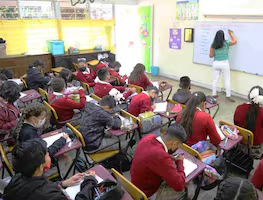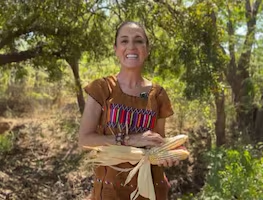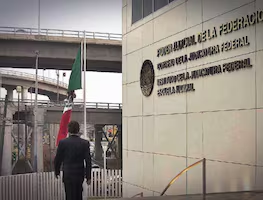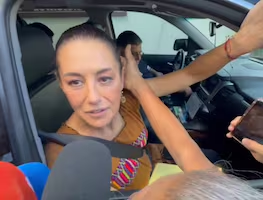Más Información

El primer megapuente de 2025 se acerca; ¿cuándo inicia y qué estudiantes tendrán descanso de 4 días?

Sheinbaum reitera protección a maíz mexicano; iniciativa enviada al Congreso rechaza siembra de trangénico

SIPINNA se suma a estrategia “México te abraza”; presenta recomendaciones para proteger niñez y adolescencia migrante

CEPL, en espera de orden del Tribunal Electoral; busca asumir proceso interrumpido del Comité del Poder Judicial

Tras sanciones de Trump a Colombia, Sheinbaum dice que hay que respetar a todos los países; “me tengo que informar bien para poder opinar”
The Trump administration increased pressure on Venezuelan President Nicolás Maduro Thursday, targeting a lifeline he has used for selling crude oil run by a close associate of the socialist leader who was recently jailed in Cape Verde.
Focusing primarily on Mexico-based individuals, U.S. Treasury officials sanctioned three people and the companies they ran . They are all now blocked from doing any business with the United States or American citizens.
The stiff financial move is designed to cut off Maduro’s government from hard cash earned from oil sales in a campaign led by the United States aimed at ending his rule and the nation’s historic political and economic crisis .
“The illegitimate Maduro regime created a secret network to evade sanctions , which Treasury has now exposed,” Treasury Deputy Secretary Justin G. Muzinich said in a statement. “The United States will continue to relentlessly pursue sanctions evaders, who plunder Venezuela’s resources for personal gain at the expense of the Venezuelan people.”
Recommended: Venezuela's crisis: who to blame?
The financial measures do not directly hit Maduro ally and Colombian citizen, Alex Saab , who has already been indicted by U.S. officials and arrested in recent days. But officials say they net Saab’s associates , who are accused of working to help Venezuela’s state-owned oil firm PDVSA evade U.S. sanctions.
The fresh sanctions target Saab associate, Joaquín Leal , who is a Mexican national with knowledge of the global oil market . U.S. officials accuse the two men of selling crude oil from Venezuela under the guise of operating an “oil-for-food” program that never resulted in food deliveries to Venezuela.
Leal worked with Mexico-based companies Libre Abordo and Schlager Business Group — also newly sanctioned — to broker the re-sale of over 30 million barrels of crude oil on behalf of PDVSA. U.S. officials that amounted to roughly 40% of PDVSA’s oil exports in April.
Olga Maria Zepeda
and her mother Verónica Esparza were sanctioned as co-owners of the two firms, officials said.
Schlager Business Group
, which was an administrative and back-office support services business, had no prior experience in the oil sector, officials said. It drew sanctions for allegedly entering into the global oil world on Venezuelan’s behalf by providing financial and technological support for PDVSA , U.S. officials said.
Libre Abordo
is a Mexico City-based firm that sold cleaning supplies, hospital equipment, and agricultural products. It claimed it went bankrupt in May , but Treasury officials say that in fact, it re-sold over 30 million barrels of Venezuelan crude oil. The firm had no prior experience in the oil sector before it brokered a deal benefiting PDVSA, officials said.
Recommended: Venezuela opposition leader Juan Guaidó calls for uprising against Nicolás Maduro
In July 2019 it signed two contracts with a Venezuelan-controlled firm to supply corn and tanker trucks to Venezuela. Libre Abordo accepted payment in Venezuelan crude oil in a scheme U.S. officials said was orchestrated by Saab and high-ranking Venezuelan official Tarek El Aissami .
These sanctions add to dozens of others against Venezuela including Maduro and his wife.
The Trump administration launched its campaign to oust Maduro in early 2019 , backing opposition leader Juan Guaidó as Venezuela’s legitimate leader. The U.S. is among dozens of nations that say Maduro claims power following a fraudulent election in 2018 . He maintains support from the military and international allies that include Russia , China , Iran , and Turkey .
has led at least 5 million to flee soaring inflation and shortages of medicine and gasoline.
Mexico President Andrés Manuel López Obrador
on Monday said he would sell gasoline to Venezuela for humanitarian reasons if that country asked, despite sanctions.
“Venezuela has not made a request of us, but if it were a humanitarian necessity, we would do it,” López Obrador said during a visit to the Gulf coast state of Veracruz. “We are free, Mexico is an independent country, sovereign, we make our own decisions and we don’t get involved in the policies of other countries.
“It is the self-determination of the people and help in humanitarian ways. No one has the right to oppress others, no hegemony can squash another country,” he added.

The position could stress relations with the United States , Mexico’s neighbor, and largest trading partner. López Obrador has managed to navigate a positive relationship with U.S. President Donald Trump while brushing aside Trump’s broader attacks on Mexicans and migrants .
It is also not clear Mexico would be in a position to sell gasoline . While it is an oil-producing nation, a lack of refining capacity forces it to purchase most of its gasoline from the United States. The country’s Energy Ministry said last year that three-quarters of Mexico’s gasoline is imported.
Recommended: Russians ordered Maduro not to flee Venezuela
One of López Obrador’s signature projects is building a new refinery to bolster the country’s refining capacity.
Saab
was indicted last year by federal prosecutors in Miami on money laundering charges connected to an alleged bribery scheme that pocketed more than USD $350 million from a low-income housing project for the Venezuelan government that was never built. In private, U.S. officials describe Saab as a frontman for Maduro.
Saab was arrested Friday while en route to Iran in a blow to Maduro’s government. U.S. officials believe he holds many secrets about how Venezuela’s leader, his family, and top aides allegedly siphoned off millions of dollars in government contracts amid widespread hunger in the oil-rich nation.
It was unclear how American authorities, who had been targeting the Colombian businessman for years, finally caught up with him. Saab remains in custody on the West African island , and his attorney has said he intends to fight extradition to the U.S.
Recommended: Venezuela crisis: Is the Monroe Doctrine back?
mp





